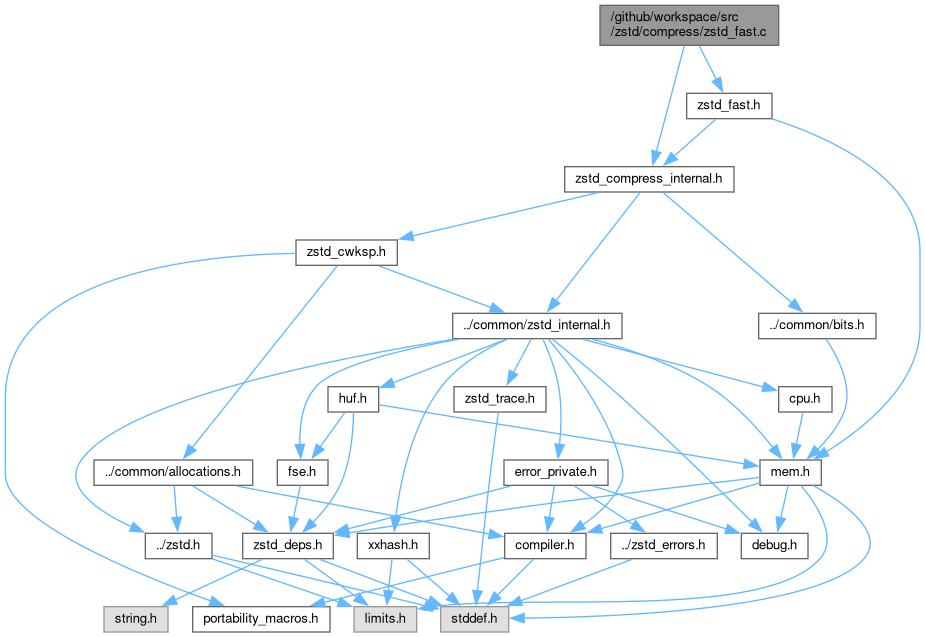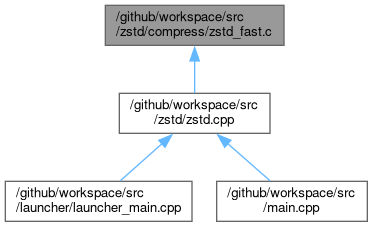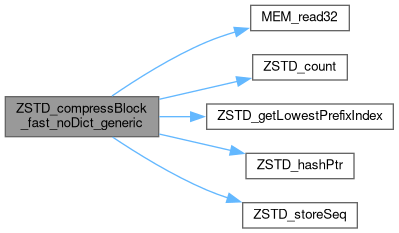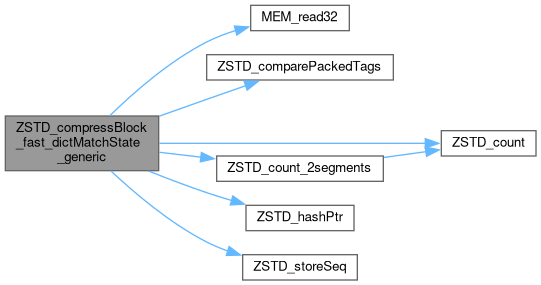

Go to the source code of this file.
Macros | |
| #define | ZSTD_GEN_FAST_FN(dictMode, mls, step) |
Macro Definition Documentation
◆ ZSTD_GEN_FAST_FN
| #define ZSTD_GEN_FAST_FN | ( | dictMode, | |
| mls, | |||
| step | |||
| ) |
Definition at line 409 of file zstd_fast.c.
Function Documentation
◆ ZSTD_compressBlock_fast()
| size_t ZSTD_compressBlock_fast | ( | ZSTD_matchState_t * | ms, |
| seqStore_t * | seqStore, | ||
| U32 | rep[ZSTD_REP_NUM], | ||
| void const * | src, | ||
| size_t | srcSize | ||
| ) |
◆ ZSTD_compressBlock_fast_dictMatchState()
| size_t ZSTD_compressBlock_fast_dictMatchState | ( | ZSTD_matchState_t * | ms, |
| seqStore_t * | seqStore, | ||
| U32 | rep[ZSTD_REP_NUM], | ||
| void const * | src, | ||
| size_t | srcSize | ||
| ) |
◆ ZSTD_compressBlock_fast_dictMatchState_generic()
| FORCE_INLINE_TEMPLATE ZSTD_ALLOW_POINTER_OVERFLOW_ATTR size_t ZSTD_compressBlock_fast_dictMatchState_generic | ( | ZSTD_matchState_t * | ms, |
| seqStore_t * | seqStore, | ||
| U32 | rep[ZSTD_REP_NUM], | ||
| void const * | src, | ||
| size_t | srcSize, | ||
| U32 const | mls, | ||
| U32 const | hasStep | ||
| ) |
◆ ZSTD_compressBlock_fast_extDict()
| size_t ZSTD_compressBlock_fast_extDict | ( | ZSTD_matchState_t * | ms, |
| seqStore_t * | seqStore, | ||
| U32 | rep[ZSTD_REP_NUM], | ||
| void const * | src, | ||
| size_t | srcSize | ||
| ) |
◆ ZSTD_compressBlock_fast_noDict_generic()
| FORCE_INLINE_TEMPLATE ZSTD_ALLOW_POINTER_OVERFLOW_ATTR size_t ZSTD_compressBlock_fast_noDict_generic | ( | ZSTD_matchState_t * | ms, |
| seqStore_t * | seqStore, | ||
| U32 | rep[ZSTD_REP_NUM], | ||
| void const * | src, | ||
| size_t | srcSize, | ||
| U32 const | mls, | ||
| U32 const | hasStep | ||
| ) |
If you squint hard enough (and ignore repcodes), the search operation at any given position is broken into 4 stages:
- Hash (map position to hash value via input read)
- Lookup (map hash val to index via hashtable read)
- Load (map index to value at that position via input read)
- Compare
Each of these steps involves a memory read at an address which is computed from the previous step. This means these steps must be sequenced and their latencies are cumulative.
Rather than do 1->2->3->4 sequentially for a single position before moving onto the next, this implementation interleaves these operations across the next few positions:
R = Repcode Read & Compare H = Hash T = Table Lookup M = Match Read & Compare
Pos | Time --> -—+----------------— N | ... M N+1 | ... TM N+2 | R H T M N+3 | H TM N+4 | R H T M N+5 | H ... N+6 | R ...
This is very much analogous to the pipelining of execution in a CPU. And just like a CPU, we have to dump the pipeline when we find a match (i.e., take a branch).
When this happens, we throw away our current state, and do the following prep to re-enter the loop:
Pos | Time --> -—+----------------— N | H T N+1 | H
This is also the work we do at the beginning to enter the loop initially.
Definition at line 148 of file zstd_fast.c.

◆ ZSTD_fillHashTable()
| void ZSTD_fillHashTable | ( | ZSTD_matchState_t * | ms, |
| const void *const | end, | ||
| ZSTD_dictTableLoadMethod_e | dtlm, | ||
| ZSTD_tableFillPurpose_e | tfp | ||
| ) |
Definition at line 87 of file zstd_fast.c.



